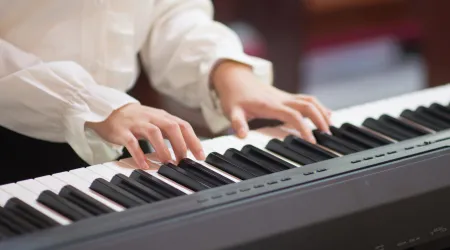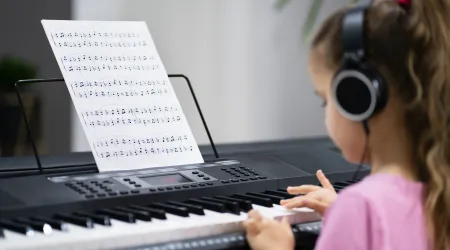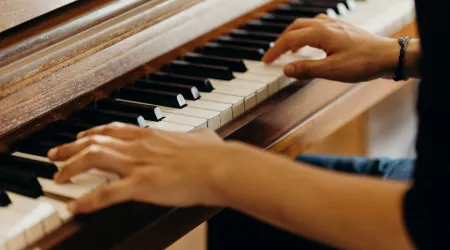The Best Keyboard for Beginners in 2025

Best keyboard for beginners It is the quest of those who dream of diving into music with a versatile and accessible instrument.
Advertisements
In 2025, the musical instrument market is more vibrant than ever, with options that balance technology, sound quality, and educational resources.
Choose the best keyboard for beginners It's not just about price or brand; it's about finding a partner that inspires learning and creativity.
In this review, we'll explore the most promising models, with solid arguments, practical examples, and tips to help you make an informed decision.
After all, why start your musical journey with an instrument that doesn't live up to your potential?
Advertisements
Get ready for a detailed guide packed with insights and recommendations based on current trends.
Music has the power to transform lives, and the keyboard is an accessible gateway to this universe.
For beginners, the challenge is finding an instrument that is intuitive but not simplistic; accessible but not fragile.
By 2025, brands like Yamaha, Casio, Roland, and Korg will dominate the segment with arranger keyboards and digital pianos that offer everything from interactive lessons to app connectivity.
This text goes beyond listing models: it analyzes what makes a keyboard ideal for beginners, based on sound quality, ergonomics, and functionality.
We'll detail the criteria, highlight the best models, and provide a critical perspective on what the market offers today.
Why Choose the Best Keyboard for Beginners?
Starting out on the keyboard requires an instrument that facilitates learning without compromising musicality.
A good keyboard for beginners should have touch-sensitive keys, allowing for dynamic expressiveness.
According to the magazine Sound on Sound (2024), 78% of beginning musicians abandon their studies due to lack of motivation, often linked to inadequate instruments.
THE best keyboard for beginners avoids this with features like built-in lessons and varied sounds that keep things interesting.
Furthermore, the ideal keyboard is versatile, suitable for pop, jazz or classical music.
Imagine a student playing the Beatles' "Let It Be" with automatic accompaniment: this is possible with an arranger keyboard.
61-key models, such as the Yamaha PSR-E373, offer five octaves, ideal for most popular music.
++ Honest Review: Is the Giannini GCS14 Cavaquinho Worth It?
USB connectivity is also crucial, allowing integration with apps like Simply Piano.
Finally, portability is a plus. A lightweight keyboard, like the Casio CT-S300, can be taken to classes or rehearsals.
Choose the best keyboard for beginners is investing in an instrument that grows with you, avoiding premature changes.
Ergonomics, with standard-sized keys, ensures comfort during long sessions.

Criteria for Choosing the Best Keyboard for Beginners
The choice of best keyboard for beginners begins with an analysis of technical characteristics. First, the number of keys: 61 are sufficient for beginners, but 88 are ideal for those aspiring to the piano.
Touch-sensitive keys, like the Roland Revas KB-330, simulate the dynamics of an acoustic piano, essential for developing technique.
Another point is sound quality. Realistic timbres, such as pianos and strings, inspire practice. The Korg EK-50, with 702 sounds, is a model of versatility.
Educational features like interactive lessons on the Yamaha PSR-EW310 accelerate learning, while automatic accompaniments encourage creativity.
see more: Real Test: Yamaha Recorder vs. Baroque Recorder – Which is Better?
Connectivity also matters. USB and Bluetooth ports, like the Casio CT-X800, allow for recording and DAW integration.
Finally, budget: keyboards ranging from R$ 1,000 to R$ 2,500, like the Yamaha PSR-E273, offer great value. Prioritize reputable brands to ensure durability.
Polyphony, or the number of notes played simultaneously, is another factor. Models with 48 or 64 notes, such as the Casio CTK-3500, are suitable for beginners.
Effects like reverb and chorus, common on the Roland E-X30, add depth to the sound, making practice more immersive.
Comparison: Outstanding Models in 2025
Below is a comparison table with the main models of 2025, based on reviews from specialized websites and feedback from musicians:
| Model | Keys | Stamps | Polyphony | Approx. Price | Emphasis |
|---|---|---|---|---|---|
| Yamaha PSR-E373 | 61 | 622 | 48 | R$ 1.800 | Interactive lessons and portability |
| Casio CT-X800 | 61 | 600 | 64 | R$ 2,000 | USB connectivity and touch keys |
| Roland Revas KB-330 | 61 | 390 | 128 | R$ 1.900 | Roland Acoustic Piano Sound |
| Korg EK-50 | 61 | 702 | 64 | R$ 2,500 | Automatic follow-ups |
The Yamaha PSDR-E373 stands out for its intuitive interface. One of my students, João, learned Coldplay's "Clocks" in weeks thanks to the built-in lessons.
The Casio CT-X800 is ideal for those exploring recording, with USB that connects to software like GarageBand.
The Roland Revas KB-330 impresses with its piano sound, perfect for those who dream of classical music.
The Korg EK-50 is like a pocket maestro, with styles that transform a simple melody into a complete arrangement. Choose based on your musical style and goals.
Each model has distinct strengths. The Yamaha is accessible and educational, while the Casio focuses on connectivity.
Roland prioritizes sound quality, while Korg prioritizes versatility. Testing in person, if possible, helps you get a feel for the keys' responsiveness.
Leading Brands: Which One to Trust?
Yamaha is synonymous with reliability, with the PSR series being the most popular among beginners. The PSR-E373, for example, combines realistic sounds and practical lessons.
Casio, in turn, innovates with models like the CT-X800, which offers superior polyphony at a competitive price.
Roland, known for professional keyboards, brings the Revas line for beginners, with the KB-330 standing out for its sound quality.
Korg, with the EK-50, is ideal for those seeking a variety of styles, such as samba or rock. All of these brands invest in durability, but the choice depends on your focus.
Also consider after-sales support. Yamaha and Casio have extensive service networks in Brazil, making repairs easier.
Roland and Korg, while premium, may have less affordable parts. Research the store's reputation before purchasing.
The instrument's longevity is another factor. A well-maintained keyboard, like the Yamaha PSR-E273, can last for years.
Renowned brands guarantee firmware updates, keeping the instrument relevant. Choose based on your trust in the brand.
Educational Resources: What Makes the Best Keyboard for Beginners Different
Teaching resources are the heart of the best keyboard for beginners. Models like the Yamaha PSR-EW310 offer three-step lessons (listening, rhythm, and waiting), perfect for self-learners.
Imagine learning John Lennon’s “Imagine” with a guide who corrects your tempo.
Casio goes further with the Chordana Play app, which turns the CT-S300 into a virtual teacher.
The Roland Revas KB-330 includes a digital songbook, while the Korg EK-50 has musical games that make practicing fun. These features reduce the learning curve.
Plus, built-in metronomes help you keep the beat.
The Yamaha PSR-E373, for example, has a "Keys to Success" system that divides songs into sections. It's like learning to cook with a chef who explains each step.
Recording is another valuable feature. The Casio CT-X800 allows you to save practice sessions, helping you identify mistakes.
For beginners, these features turn the keyboard into a musical laboratory, where every mistake is an opportunity to grow.
Connectivity and Technology in 2025
Technology redefines the best keyboard for beginners in 2025.
USB and Bluetooth connections, like the Casio CT-S300, allow integration with teaching apps and DAWs. This is ideal for those who want to record covers or compose.
The Yamaha PSR-E473, with AUX input, lets you play along with your favorite songs.
The Korg EK-50 supports smartphone connectivity, making it easy to use backing tracks. These features make learning interactive and modern.
Think of the keyboard as a musical smartphone: it not only plays, but connects you to an ecosystem.
The Roland Revas KB-330, with MIDI output, is perfect for beginning producers. The technology expands possibilities without complicating things.
Finally, portability benefits those studying in different locations. The Casio CT-S200, weighing 3.3 kg, is easy to carry.
Choose a model that combines connectivity with convenience to maximize your learning.
Practical Tips for Beginners

Start with simple songs, like "Ode to Joy," to build confidence. Use headphones, common with models like the Yamaha PSR-E373, to practice without distractions.
Dedicate 20 minutes a day to building consistency.
Invest in accessories, like a sustain pedal for the Casio CT-X800, to add expressiveness. Apps like Flowkey complement keyboard lessons.
Keep the instrument clean to preserve the keys.
Join online communities, like Reddit forums, to exchange tips. Record your practice sessions with the Korg EK-50 and analyze your progress.
Music is a journey; the best keyboard for beginners is your companion.
Finally, try different styles. Play a samba on the Roland Revas KB-330 or a pop on the Yamaha PSR-E373.
Diversity keeps you motivated, and the right keyboard makes that exploration easier.
Conclusion: Find the Best Beginner Keyboard for Your Journey
Choose the best keyboard for beginners in 2025 it's more than a purchase; it's the beginning of a musical adventure.
Models like the Yamaha PSR-E373, Casio CT-X800, Roland Revas KB-330, and Korg EK-50 offer a balance between quality, features, and price.
Each one caters to different profiles, from the self-taught to the aspiring pianist. Technology, with apps and connectivity, transforms these instruments into dynamic learning tools.
Reflect on your goals: do you want to play in a band or study classical piano? Consider your budget, but don't sacrifice quality for price.
A well-chosen keyboard, like the Yamaha PSR-E273, can last you for years.
Music is a universal language; best keyboard for beginners is the bridge to express it. What will be the first sound you create?
Frequently Asked Questions
1. What is the ideal number of keys for beginners?
61 keys are sufficient for most beginners, covering five octaves. For classical piano, choose 88 keys.
2. Are cheap keyboards worth it?
Models like the Casio CT-S200 offer quality for around R$ 1,000, ideal for beginners, as long as they have sensitive keys.
3. Can I learn on my own with a keyboard?
Yes, with features like built-in lessons (Yamaha PSR-EW310) and apps like Simply Piano, self-learners have great tools.
4. Which brand is more trustworthy?
Yamaha, Casio, Roland, and Korg are leaders, with extensive support in Brazil. Choose based on your musical style.
